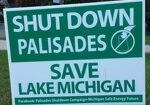Media Statement by Kevin Kamps, Beyond Nuclear, regarding the Palisades Atomic Reactor’s Shutdown for Good

NEWS FROM BEYOND NUCLEAR
For immediate release
Contact: Kevin Kamps, Radioactive Waste Specialist at Beyond Nuclear, Board of Directors Member for Don’t Waste Michigan (Kalamazoo Chapter), (240) 462-3216, [email protected]
No More Risk of Reactor Core Meltdown, No More Radioactive Waste Generation, but Significant Waste and Contamination Risks Continue
COVERT TOWNSHIP, MI and TAKOMA PARK, MD, MAY 21, 2022–“We are thankful that Palisades shut down before it melted down. The 51-year old atomic reactor has the worst embrittled reactor pressure vessel in the U.S., which was at increasing risk of catastrophic failure due to pressurized thermal shock. To accommodate Palisades’ operation, the Nuclear Regulatory Commission (NRC) simply weakened and rolled back the safety standards, multiple times over decades. Palisades also has a severely degraded reactor lid, and worn out steam generators that needed replacement for the second time in the reactor’s history. All three were major pathways to core meltdown, which an NRC commissioned report, CRAC-2 (short for Calculation of Reactor Accident Consequences, also known as the 1982 Sandia Siting Study or as NUREG/CR-2239) estimated would have caused a thousand peak early fatalities (acute radiation poisoning deaths), 7,000 peak early radiation injuries, 10,000 peak cancer deaths (latent cancer fatalities), and $52.6 billion in property damage. When adjusted for inflation alone, property damages would have surmounted $150 billion in Year 2021 dollar figures. And as Associated Press investigative reporter Jeff Donn wrote in his four-part series “Aging Nukes,” shortly after the Fukushima Daiichi nuclear catastrophe began in Japan in 2011, populations have soared around U.S. atomic reactors, so casualties would now be even higher. Donn cited reactor pressure vessel embrittlement and pressurized thermal shock risk as the top example of NRC regulatory retreat. Thank goodness no such nuclear nightmare unfolded at Palisades during its operations, but Consumers Energy (from 1971 to 2007) and Entergy (from 2007 to 2022) were willing to take those risks on the shoreline of the Great Lakes, drinking water supply for more than 40 million people in eight U.S. states, two Canadian provinces, and a very large number of Native American First Nations downstream and downwind, as well as up the food chain. Now, by definition, once the irradiated nuclear fuel is removed from the core, a reactor meltdown cannot happen at Palisades.
But the likely more than 700 metric tons of forever deadly irradiated (euphemistically called spent or used) nuclear fuel, containing more than 1,800 pressurized water reactor assemblies, and comprising more than 150 million curies of hazardous radioactivity, still represent a very significant risk. The vast majority is still stored in the indoor wet storage pool, at risk of a loss of cooling water leading to a catastrophic radioactivity release to the environment. While transfer of irradiated nuclear fuel into dry cask storage represents an increase in safety, it involves the movement of very heavy loads over the pool, and must be done very carefully. In October 2005, a 107-ton transfer cask containing irradiated nuclear fuel dangerously dangled over the pool for two days, and was nearly dropped from its crane by operator error. Had that happened, the ensuing pool fire could have dwarfed even CRAC-II’s casualties and property damage figures cited above, as Palisades’ pool is not even located in a radiological containment structure. Recently, in its careless rush job to empty a storage pool, Holtec, which plans to takeover at Palisades by the end of June, with NRC’s complicit rubber-stamp, caused a radioactive water spill that doused and dosed a worker at its Oyster Creek, New Jersey decommissioning project. In 2018, Holtec’s flawed dry cask storage design at San Onofre, California nearly caused a 50-ton loaded canister to fall nearly 20-feet. For these and many other reasons, Beyond Nuclear, Don’t Waste Michigan, and Michigan Safe Energy Future have legally challenged Holtec’s takeover of Palisades. But the NRC has refused for 15 months to grant us our day in court. We do call for expedited transfer of irradiated nuclear fuel out of the vulnerable pool, but not into Holtec’s dubious and defective dry casks, but rather into safe and secure Hardened On-Site Storage, in order to protect health and environment for the decades the irradiated nuclear fuel will likely be stuck at Palisades with nowhere to go. But Palisades’ shutdown for good means no more high-level radioactive waste will be generated there, which is a very good thing.
Due to all the risks above, Governor Whitmer and Energy Secretary Granholm’s unwise last-second scheme to bail out Palisades with many hundreds of millions of dollars of taxpayer money, and keep it operating for nine more years, must be stopped. So too is Holtec CEO Krishna Singh’s bait and switch to construct and operate a so-called Small Modular (Nuclear) Reactor at the Palisades site an outrageous, high-risk non-starter.
It is now time to safeguard and secure the high-level radioactive waste stored on-site, to clean up the widespread radioactive contamination of the property before it further threatens Lake Michigan and adjacent groundwater aquifers, and to carry out a just transition for the workforce and host region, into the long overdue clean, safe, and affordable renewable and efficient energy system of the future.”
-30-
Beyond Nuclear is a 501(c)(3) nonprofit membership organization. Beyond Nuclear aims to educate and activate the public about the connections between nuclear power and nuclear weapons and the need to abolish both to safeguard our future. Beyond Nuclear advocates for an energy future that is sustainable, benign and democratic. The Beyond Nuclear team works with diverse partners and allies to provide the public, government officials, and the media with the critical information necessary to move humanity toward a world beyond nuclear. Beyond Nuclear: 7304 Carroll Avenue, #182, Takoma Park, MD 20912. [email protected]. www.beyondnuclear.org.
Support Beyond Nuclear
Help to ensure a safer, greener and more just world for all

